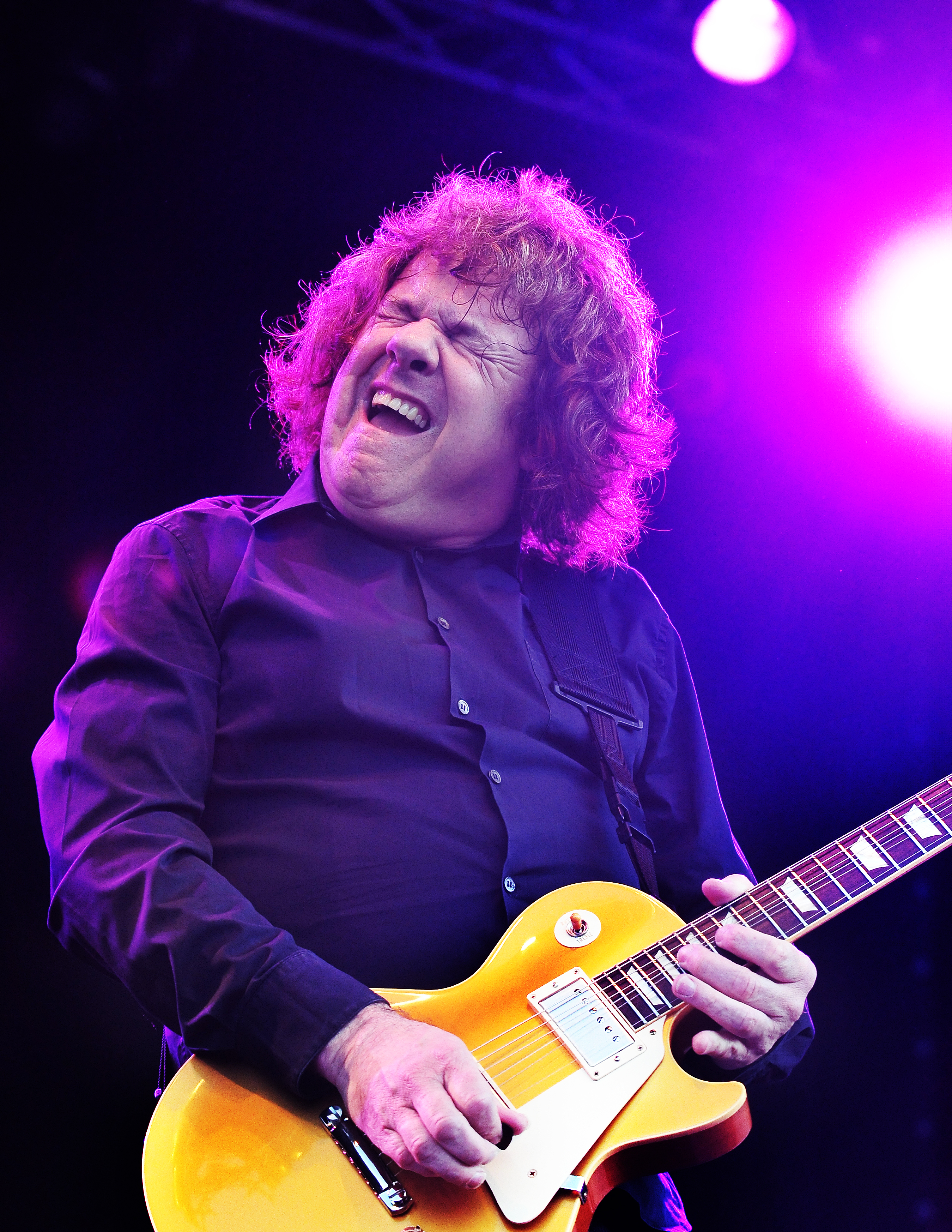
Gary Moore
Robert William Gary Moore (4 April 1952 – 6 February 2011) was a Northern Irish musician. Over the course of his career, he played in various groups and performed a range of music including blues, blues rock, hard rock, heavy metal and jazz fusion.
For other people named Gary Moore, see Gary Moore (disambiguation).
Influenced by Peter Green and Eric Clapton, Moore began his career in the late 1960s when he joined Skid Row, with whom he released two albums. After Moore left the group he joined Thin Lizzy, featuring his former Skid Row bandmate and frequent collaborator Phil Lynott. Moore began his solo career in the 1970s and achieved major success with 1979's "Parisienne Walkways", which is considered his signature song. During the 1980s, Moore transitioned into playing hard rock and heavy metal with varying degrees of international success. In 1990, he returned to his roots with Still Got the Blues, which became the most successful album of his career. Moore continued to release new music throughout his later career, collaborating with other artists from time to time. Moore died on 6 February 2011 from a heart attack while on holiday in Spain.
Moore was often described as a virtuoso and has been cited as an influence by many other guitar players. He was voted as one of the greatest guitarists of all time on respective lists by Total Guitar and Louder. Irish singer-songwriter Bob Geldof said that "without question, [Moore] was one of the great Irish bluesmen".[1] For most of his career, Moore was heavily associated with Peter Green's famed 1959 Gibson Les Paul guitar. Later he was honoured by Gibson and Fender with several signature model guitars.
Early life[edit]
Robert William Gary Moore was born in Belfast on 4 April 1952,[2][3] the son of Winnie, a housewife, and Robert Moore, a promoter who ran the Queen's Hall ballroom in Holywood.[2][3][4] He grew up near Belfast's Stormont Estate with four siblings.[3] He credited his father for getting him started in music. When Moore was six years old, his father invited him onstage to sing "Sugartime" with a showband at an event he had organised, which first sparked his interest in music. His father bought him his first guitar, a second-hand Framus acoustic, when Moore was 10 years old.[3][5][6]
Though left-handed, he learned to play the instrument right-handed.[5] Not long after, he formed his first band, The Beat Boys, who mainly performed Beatles songs.[3][5] He later joined Platform Three and The Method, amongst others.[7] Around this time, he befriended guitarist Rory Gallagher, who often performed at the same venues as him.[8] He left Belfast for Dublin in 1968 just as The Troubles were starting in Northern Ireland. A year later, his parents separated.[2][4]
Career[edit]
Skid Row[edit]
After moving to Dublin, Moore joined Irish blues rock band Skid Row. At the time, the group were fronted by vocalist Phil Lynott. He and Moore soon became friends and shared a bedsit in Ballsbridge.[2] However, after a medical leave of absence, Lynott was asked to leave Skid Row by the band's bassist Brush Shiels, who had taken over lead vocal duties.[9][10] In 1970, Skid Row signed a recording contract with CBS,[11] and released their debut album Skid, which reached number 30 on the UK Albums Chart.[12] After the album 34 Hours in 1971, and tours supporting The Allman Brothers Band and Mountain amongst others, Moore decided to leave the band.[11][13] Moore had become frustrated by Skid Row's "limitations", opting to start a solo career.[3] In retrospect, Moore stated: "Skid Row was a laugh but I don't have really fond memories of it, because at the time I was very mixed up about what I was doing."[14] Sebastian Bach, former frontman of the American heavy metal band Skid Row, claimed that Moore sold them the rights to the name in 1987 for a reported $35,000.[15] Brush Shiels contested the story in 2012, claiming he still owns the rights.[16] Rachel Bolan of the American Skid Row also refuted the story in 2019, stating: "There was never any money exchange. Snake and I went and trademarked the name, and there was no problem."[17]
Personal life[edit]
In the mid-1970s, Moore was involved in a bar fight which left him with facial scars. According to Eric Bell, Moore was with his girlfriend at Dingwalls when two men "started mouthing about Gary's girlfriend [...] what they'd like to do to her". After Moore confronted them about it, one of the men smashed a bottle on the bar and slashed Moore's face with it. This had a profound effect on him. Bell said, "It did change him. A lot of that pent-up anger and emotion would come out in his playing. And it came out in other ways too. It must be a hard thing to come back from something like that." During the 1980s, he would hide his scars in photographs and videos by looking down or being framed from a distance.[31][75]
Moore was married to his first wife Kerry from 1985 to 1993.[51][76][77] Before divorcing, they had two sons, Jack (who would also go on to become a musician[78]) and Gus.[76] Moore later had a daughter, Lily (who also embarked on a career in music[79]), during a relationship with Jo Rendle.[76][80] Moore also had a daughter named Saoirse from another relationship.[81] At the time of his death, Moore was in a relationship.[82]